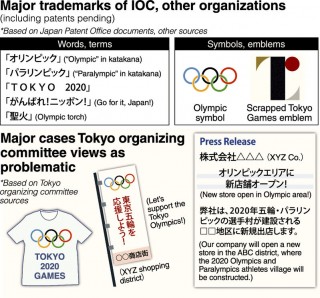Loading
Search
▼ Olympic Authorities Call Foul On Logo Use / Some Say Limits On Games References Are Too Strict
- Category:Event
The Yomiuri Shimbun
The organizing committee for the Tokyo Olympic and Paralympic Games is increasing its demands that companies and organizations stop the unauthorized commercial use of logos and phrases related to the 2020 Games.
The Tokyo 2020 Organizing Committee plans to speed up its efforts in disseminating the fact that the logos and phrases are protected by intellectual property rights, but the committee’s strict demands are perplexing companies and organizations that struggle to distinguish which uses are safe and which are not.
Calling for corrections
Last autumn, a major Tokyo-based company received a request from the organizing committee immediately after it posted on its website a report of holding a lecture course aimed at nurturing volunteers for Paralympic sports. The firm had invited a Paralympian as a lecturer.
“It [the report] counts as commercial use. We ask you to correct some of the wording,” the committee said. The committee asserted that three expressions stressing Paralympics were problematic, such as one that said, “regarding Tokyo’s hosting of the Paralympic Games.”
After deleting the expressions, the company posted the report again on its website. “We didn’t intend to use the report as company publicity,” a company employee in charge of the report said. “I was surprised by the strictness of the checking.”
In summer last year — the time before the organizing committee canceled its official emblem for the 2020 Games — a convenience store owner in Tokyo planned to use a photo showing oden boiled food items forming the shape of the emblem for a sales promotion poster. The organizing committee demanded that the plan be stopped, as it was an unauthorized use of the design.
According to the organizing committee, the number of contacts — including requests and inquiries — to companies and organizations regarding the unauthorized use of logos and expressions have reached about 1,000 since the committee was launched in January 2014. The number is on the rise.
Protecting sponsors
The International Olympic Committee protects logos, names and other expressions regarding the Olympics and Paralympics as intellectual property, banning the commercial use of them.
Some of them have been trademarked by the IOC, the Japanese Olympic Committee (JOC) and other organizations. Their use in Japan is overseen by the Tokyo 2020 Organizing Committee. As of Wednesday, only 40 sponsors are allowed to use such logos and names.
The organizing committee has been asking companies and organizations to refrain from using expressions such as “Let’s support the Tokyo 2020 Olympics!” and “Congratulations to Tokyo hosting the Olympics,” saying that the remarks may amount to the “creation of confusion” stipulated in the Unfair Competition Prevention Law.
The main reason why the IOC and the organizing committee are so keen on protecting intellectual property is the fact that ¥150 billion — or about 40 percent of the operating expenses for the 2020 Games, according to a 2014 estimate — will be procured from sponsors’ funding.
“There will be no reason for sponsors to provide money if everyone can use Olympic intellectual property freely,” an organizing committee official said.
Spreading influence
Some have expressed puzzlement over the organizing committee’s restrictive stance.
An incorporated foundation in the Tokai region was asked by the organizing committee to change the phrase used in its notice regarding an event to experience wheelchair basketball in September last year. Some expressions such as “Mezase Pararinpian (Try to be a Paralympian)” were seen as problematic. The organizing committee regarded the copy as a
“commercial use” because the foundation’s parent organization is a sporting goods manufacturer.
“Our goal [for the event] was to promote the attraction of sports for the disabled, but it wasn’t seen that way,” a foundation staff member in charge said.
To conclude whether any campaign corresponds to commercial use or creates confusion, a holistic examination is needed to consider such factors as how these items are presented, including indication methods and overall context.
“Sponsors’ interests should be protected, but overly strict regulations could poison people’s enthusiasm,” said Hitoshi Nakamura, an expert patent attorney at a sports-related intellectual property business. “The organizing committee must thoroughly explain rules to win understanding from the public.”
- March 17, 2016
- Comment (0)
- Trackback(0)


